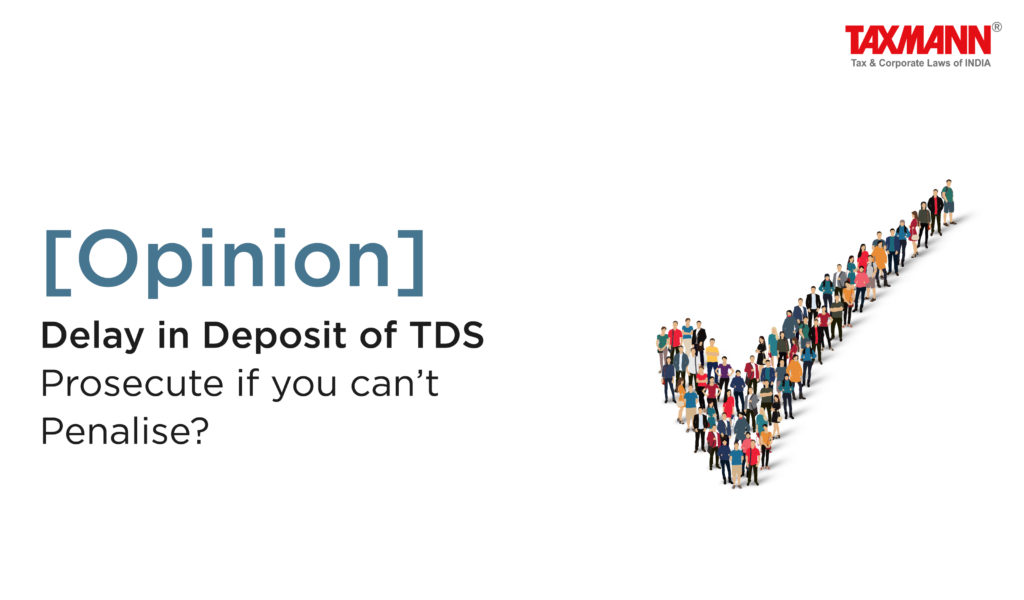[Opinion] Delay in Deposit of TDS | Prosecute if you can’t Penalise?
- Blog|News|GST & Customs|
- 2 Min Read
- By Taxmann
- |
- Last Updated on 11 July, 2023

Sumit Mangal & Radhika Sharma – [2023] 152 taxmann.com 126 (Article)
Introduction
Tax Deducted at Source (TDS) is a crucial component of the Indian tax system, ensuring timely collection of taxes and reporting of taxable transactions. Non-compliance with TDS obligations can have serious ramifications, including prosecution, as stipulated under Section 276B of the Income Tax Act, 1961 (“Act“). However, recent developments, such as the Supreme Court’s ruling in the case of US Technologies International (P.) Ltd. v. CIT [2023] 149 taxmann.com 144/293 Taxman 27/453 ITR 644, have shed light on a perplexing aspect: while penalty cannot be imposed for delay in deposit of TDS under Section 271C of the Act, prosecution may be launched under Section 276B of the Act. In this article, we explore this dichotomy and the implications it has on taxpayers.
The Supreme Court’s Ruling and the Absence of Penal Consequences?
In the case of US Technologies International (P.) Ltd. (supra), the Supreme Court ruled that on mere belated remitting of the TDS after deducting the same by the concerned person/assessee, no penalty shall be leviable under Section 271C of the Act. This is due to the specific language of Section 271C which only covers failure to deduct tax and does not cover situation of belated deposit of tax, unlike the language in Section 201 of the Act which deals with levy of interest that covers both the situations. This landmark decision has created a significant paradox within the tax framework. On one hand, the law prescribes prosecution for delayed deposit of TDS under Section 276B of the Act. On the other hand, the absence of any penalty for such delays raises questions regarding the effectiveness and fairness of the legislation.
Interestingly, there is another penalty provision under the Act that lays down penal consequences if the taxpayer is treated as the assessee in default as defined under Section 201 of the Act; however, this provision was not discussed in the judgment of US Technologies International (P.) Ltd’s. case (supra). As per Section 221 of the Act, if the taxpayer fails to deduct or pay the tax in accordance with the provisions of the Act, the taxpayer shall be treated as an assessee in default and shall be liable to a penalty not exceeding the amount of tax in arrears.
Click Here To Read The Full Article
Disclaimer: The content/information published on the website is only for general information of the user and shall not be construed as legal advice. While the Taxmann has exercised reasonable efforts to ensure the veracity of information/content published, Taxmann shall be under no liability in any manner whatsoever for incorrect information, if any.

Taxmann Publications has a dedicated in-house Research & Editorial Team. This team consists of a team of Chartered Accountants, Company Secretaries, and Lawyers. This team works under the guidance and supervision of editor-in-chief Mr Rakesh Bhargava.
The Research and Editorial Team is responsible for developing reliable and accurate content for the readers. The team follows the six-sigma approach to achieve the benchmark of zero error in its publications and research platforms. The team ensures that the following publication guidelines are thoroughly followed while developing the content:
- The statutory material is obtained only from the authorized and reliable sources
- All the latest developments in the judicial and legislative fields are covered
- Prepare the analytical write-ups on current, controversial, and important issues to help the readers to understand the concept and its implications
- Every content published by Taxmann is complete, accurate and lucid
- All evidence-based statements are supported with proper reference to Section, Circular No., Notification No. or citations
- The golden rules of grammar, style and consistency are thoroughly followed
- Font and size that’s easy to read and remain consistent across all imprint and digital publications are applied



 CA | CS | CMA
CA | CS | CMA
